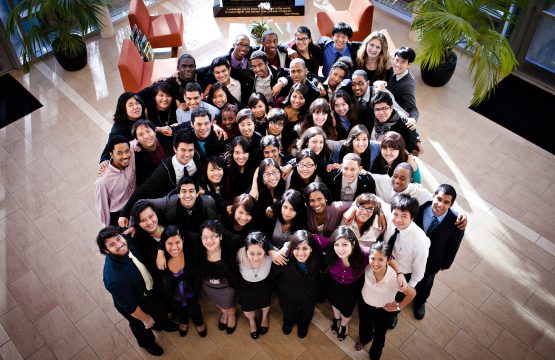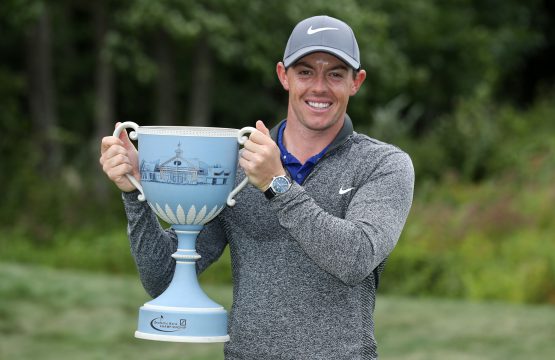Importance of the right people
I owe a lot to the Tiger Woods Foundation. I work as a program coordinator for the Earl Woods Scholarship Program, and recently relocated to Washington, D.C., as we expand our reach. I’m not just thankful to them for my job, but for also introducing me to so many people that would end up being an instrumental force in creating positive and meaningful growth in my life.
Ten years ago, the Tiger Woods Learning Center (TWLC) opened in Anaheim, California. I was 15, a sophomore attending neighboring Savanna High School. My parents, two Bengali-Muslim immigrants, gave up everything they knew to immigrate and subsequently move to Anaheim. My mom worked at a shoe store, while my dad was a security guard who moonlit as a gas station attendant. They had to learn a new language, a new culture, find new homes and new jobs — all for the sake of giving my brother and I the ultimate chance to succeed. My mom, looking for ways for me to get out of the house, enrolled me in classes at the TWLC. I was so upset. My favorite moment in school was when I finally got to go home, and I believed the learning center was only going to be another barrier to delay that moment.
I was wrong. Over the course of the next year, the learning center became my second home. This was the first place where I felt like I belonged. In school, I always felt that I was in an “out” group, that I wasn’t supposed to be here. I kept believing that my experience wasn’t the experience of a Southern California teenager and that there was something wrong with me or my upbringing. The learning center changed that. My first two instructors at the TWLC, Chris Carr and Josh Rivera, created a classroom environment that was project and teamwork intensive, and regularly encouraged me to break out of my comfort zone. They grew to eventually become my mentors while I was at the learning center and encouraged me to find the right people with which to surround myself. It was the first time where I felt I had educators who actively advocated for my future and me. They were the first educators that made me feel valued.

I was motivated by the culture of the learning center and knew I wanted to give back in some way. I became a volunteer for the TWLC, believing that this could also serve as an easy means to obtain volunteer hours. But the work I was asked to do was real and meaningful. Through my volunteer work, I was offered a part-time job for the learning center, working in our academic support section while I attended community college. Through this experience, I was able to work with Nick Novak and David Tong. Having been placed in a professional work setting at 17 didn’t come as easily to me as I wish it could’ve. No matter how old, working with students can be especially challenging, and I struggled. I didn’t want to admit it as an employee, but I still needed guidance and help. David and Nick took me under their wings and embraced having a dopey college kid to work with. They were always there for me, and consistently took time out of their day to help me become better at my role.
I left my position at the learning center when I transferred to the University of California, Irvine (UCI) to finish my undergraduate degree. I was still unsure of what I wanted to do after college, let alone know in which field I wanted to work. I became a professional at being able to offer the most vague responses when asked about my future. I left UCI with a degree in political science and a minor in educational studies. After graduating without a job lined up, I emailed Kathy Bihr to see if she wanted to catch up over a cup of coffee. Our conversation ended up turning into another opportunity to come back to the learning center to work for our scholarship program.
I started working for the scholarship program a little over a year ago. My role was centered on delivering and developing curriculum for our college-access programs while also working alongside the rest of our team, ensuring the success of our Earl Woods Scholars. Through this, I was able to work closely with Cristina Fernández and Denisse Jover. I came into the role very green. College access in 2016 is a minefield of archaic complexities, let alone what it’s actually like to be a college student once our students get there. Having to learn so much on the fly was challenging, but again, I had so much support. I lovingly call Denisse my older sister, as she has been my guide throughout this past year. Coming into work every day and seeing Denisse’s passion, her work ethic and the thoughtfulness and care she puts into her craft is nothing but inspiring. From Cristina, I’ve learned so much about leadership. While she’s my director whom I report to, her leadership style is catered toward creating mutual trust between herself and our team. She continues to challenge us, while also making sure we’re in the best position to succeed.
Coming from a first-generation background, there were so many opportunities where my parents’ sacrifices could’ve gone for naught. I was incredibly lucky to have had these mentors and teachers that offered their support to help me grow and find my own success. Working in our scholarship program is always a surreal experience. I see so much of my story in the stories of our current scholars. I remember feeling that my experience was lonely and only mine. And now, that experience is crucial for me in relating to our students and throughout this work. I was lucky to find the right people through the foundation; my goal is to hopefully be the right person for our scholars now.
Champions of the unexpected for 20 years.


